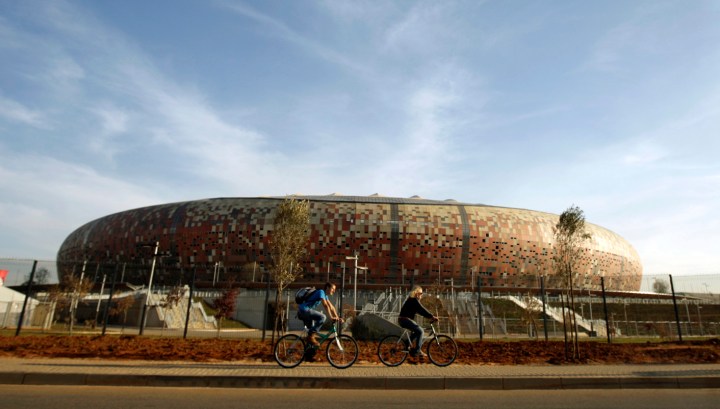Maverick Life
Analysis: Bicycle-friendly towns – and how Jo’burg can move ahead as a greener city

This week, Johannesburg hosted mayors from the 40 largest cities (C40) in the world, discussing how to reduce the ecological footprint of cities. The one obvious answer is, of course, to move to greener modes of transport. But exactly how viable is it to make Jo’burg a bicycle-friendly city? By NJOGU MORGAN & OLIVIER LEVEQUE.
This week Johannesburg hosted mayors from the 40 largest cities (C40) in the world. The broad agenda was lesson sharing on reducing the ecological footprint of cities. This is an urgent discussion, given growing environmental challenges such as climate change.
Climate change is widely acknowledged as a serious problem. The last report from the global panel of scientists assembled by the United Nations agreed that greenhouse gas concentrations were at their highest levels seen in the last 800,000 years. It is therefore hugely likely that extreme weather such as heat waves and extremely cold temperatures will occur more frequently and over longer durations in future.
Some impacts are locked into the system, but any actions taken now can reduce the scale and intensity of future changes – changes which are hitting the most vulnerable the hardest.
One of the actions that can be taken is to move to greener modes of transportation. Globally, about 13% of greenhouse gas emissions occur in the transportation sector. Of this share, 75% are produced by vehicles . In South Africa, the role of transportation in contributing to climate change is pronounced, as noted by the government: “The transport sector is the most rapidly growing source of greenhouse gas emissions in South Africa, and is the second most significant source of greenhouse gas emissions”.
Cycling is, of course, a lower carbon form of transportation, and the City of Johannesburg has made some strides in this direction already. For example, it has announced some plans for building dedicated commuter bicycle paths in Orlando, Soweto. It has also announced intentions to build a cycling corridor linking the University of the Witwatersrand and the University of Johannesburg. Delivery, however, has been slow.
This is where there is much to be learned from other C40 cities. No city is the same. Therefore the specific policy and technical approaches will differ. One significant lesson Johannesburg can learn from the other cities it hosted is that the path to a cycling-friendly status requires bold and ambitious leadership. Bogota, London, New York, Rio de Janeiro and Chicago are increasingly cycling-friendly in part because their governments are led by dynamic mayors and officials infused with a sense of the possible. This is supported by financial, technical and policy investments.
The good news is that were such leadership and ambition to be emulated in Johannesburg, it would fall upon very fertile ground. As observers of cycling trends in the City, JUCA sees growing interest in everyday cycling. On commutes, security guards, bankers, teachers, students and others can be spotted travelling by bicycle and there is an emerging range and volume of social bike rides taking place on the streets. One such ride is the Critical Mass ride, which takes place on the last Friday of every month and now features at least 1,000 cyclists. This number has grown from a mere 60 in less than two years. At the back of many cars, yellow stickers can be seen, reminding other motorists to observe a 1.5 metre passing distance from cyclists.
The technical and policy solutions to transform Johannesburg into a cycling-friendly city are fairly straightforward as well. The key principle that informs them is that they seek to realise the rights of those who choose to cycle to do so without fear or prejudice.
The Johannesburg Urban Cyclists Association’s contribution in this regard is a soon-to-be printed Johannesburg Commuter Bicycle Map, which clearly illustrates around 100 kilometres of safer cycling routes. A preliminary version can be downloaded from www.juca.org.za. Contrary to popular perception, Johannesburg is already to some extent a cycling friendly city. Many streets are traffic-calmed and have low volumes of traffic, but these corridors of two-wheeled mobility are undiscovered and unknown. The map reveals these routes. The safer, and flatter routes link high-density residential areas to economic hubs, student residence areas to campuses, and high streets to parks.
It is JUCA’s intention to continuously improve this network. To be truly effective in assisting everyday cycling, JUCA believes it is essential that this network is materialised physically. This could be done cheaply and quickly using on-street markings and signed poles that alert motorists to the presence of cyclists on the road.
With these and other solutions, Johannesburg can join and surpass other C40 cities in the cycling-friendly agenda. Such cities recognise the social, environmental and economic benefits linked to cycling. It is no surprise that cycling-friendly cities are increasing associated with high degree of resident satisfaction and loyalty. They are seen as attractive places to live in and tend to draw in investments. Others bucking this trend are seeing residents and firms voting with their feet. For example, because of the high degrees of traffic related pollution, many who can are leaving Beijing.
Johannesburg can choose the former vision. JUCA’s vision for Johannesburg is one where children can cycle to school on the streets without inducing anxiety in their caregivers or parents, and where all those who choose to cycle can hop on their two wheels without experiencing trepidation or suffering stigma. DM
Photo: People ride bicycles past the Soccer City stadium in Soweto, Johannesburg June 2, 2010. REUTERS/Henry Romero
Njogu Morgan and Olivier Leveque are board members of the Johannesburg Urban Cyclists Association (www.juca.org.za). They both use their bicycles as their primary mode of transport. Njogu is a PhD candidate at Wits University investigating development of cultures of mobility that support cycling for everyday purposes. Olivier works as a project manager in the financial industry.



















 Become an Insider
Become an Insider